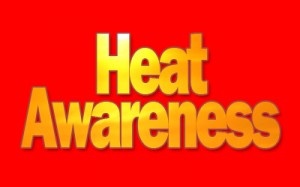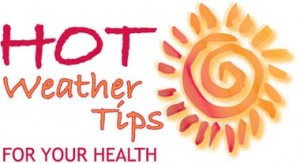 Heat can kill. That’s why Wisconsin Emergency Management and the National Weather Service are reminding people of the dangers associated with extreme heat and to promote safety measures.
Heat can kill. That’s why Wisconsin Emergency Management and the National Weather Service are reminding people of the dangers associated with extreme heat and to promote safety measures.
Heat is the number one weather-related killer in the United States and Wisconsin far exceeding tornadoes, severe storms and floods combined.
In 1995, two major killer heat waves affected most of Wisconsin, resulting in 154 heat-related deaths and over 300 heat-related illnesses. Summer heat waves have been the biggest weather-related killers in Wisconsin for the past 50 years, far exceeding tornadoes and severe storms.
In the summer of 2011, Wisconsin lost five people to heat-related illnesses during the July 18-22 heat wave. A 60 year old man in Fountain Prairie died while helping a family member with outdoor housework. Also an 82 year old woman in Prairie du Chien, a 80 year old man in Marquette County and an 87 year old Reedsburg woman lost their lives in the heat. The Reedsburg victim was found dead in her trailer which apparently did not have air conditioning. And a 65-year-old Sparta woman died on July 23. She did not have air conditioning in her home and she also had an underlying health condition.
In 2012, Wisconsin had confirmed 24 heat related deaths, most occurred during five days of Excessive Heat Warnings from July 2-6. The heat index rose to 105 F degrees for 48 hours with night time lows of 75 F. It was the second hottest and third longest heat wave in Wisconsin. None of the victims had air conditioning and did not seek shelter at one of the many cooling centers which opened around the state.
 To help keep cool this summer, here are some tips to keep safe in hot weather:
To help keep cool this summer, here are some tips to keep safe in hot weather:
- Never leave children, disabled persons, or pets in a parked car – even briefly. Temperatures in a car can become life threatening within minutes. On an 80-degree day, the temperature inside a car even with the windows cracked slightly can reach 100 degrees in less than 10 minutes! Click here for demonstration of extreme heat in cars (wmv 3Mb)
- Keep your living space cool or seek shelter at cooling center: If you have an air conditioner, use it. Cover windows to keep the sun from shining in. If you don’t have an air conditioner you should consider going to a community cooling center. If you stay at home, open windows to let air circulate. At extreme high temperatures, a fan loses its ability to effectively reduce heat-related illness. When it’s hotter than 95 degrees use fans to blow hot air out of the window rather than to blow hot air on your body. Basements or ground floors are often cooler than higher floors.
- Slow down and limit physical activity. Plan outings or exertion for the early morning or after dark, when temperatures are cooler.
- Drink plenty of water and eat lightly. Don’t wait for thirst, but instead drink plenty of water throughout the day. Avoid alcohol or caffeine and stay away from hot, heavy meals.
- Wear lightweight, loose-fitting, light-colored clothing. Add a hat or umbrella to keep your head cool…and don’t forget sunscreen!
- Don’t stop taking medication unless your doctor says you should. Take extra care to stay cool, and ask your doctor or pharmacist for any special heat advice.
- Taking a cool shower or bath will cool you down. A shower or bath will actually work faster than air conditioner. Applying cold wet rags to the neck, head and limbs also cools down the body quickly.
Symptoms of heat-related illness and what to do:
• Heat Cramps – cramps or muscle spasms in the abdomen, arms or legs.
Solution: Stop activity. Cool down, drink clear juice or sports drink.
• Heat Exhaustion – heavy sweating, paleness, muscle cramps, weakness, dizziness, headache, nausea, fainting.
Solution: Cool down, seek medical attention.
• Heat Stroke – extremely high body temperature, red, hot, dry skin, rapid pulse, throbbing headache, dizziness, nausea, confusion, unconsciousness.
Solution: Call 911 and cool the victim with shower or hose until help arrives.